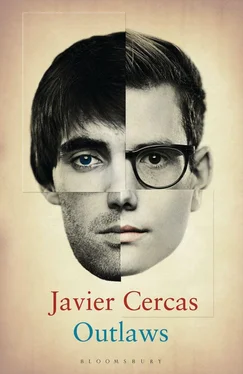‘So that’s where it all started. I mean that’s where María’s story started.’
‘Just as I’ve told it to you. No one meant to create a new media personality. With Zarco’s celebrity we had enough: what we wanted was to get it back into circulation, back into existence, for people to remember him. The rest, I repeat, was pure coincidence.’
‘I believe you: if anyone had put forward the idea of creating a media personality like María Vela, they would have failed.’
‘Exactly. All those theories that paint me as the genius who invented María and then María backfiring on me don’t hold water. The reality is that at most, as you say, I encouraged her; but she immediately dispensed with me and went on her way. What I really reproach myself for is not having seen earlier that María was taking control of our story, that she rather than Zarco was beginning to be the centre of the interviews, and that she’d turned into a celebrity as popular as Zarco.’
‘When did you realize that?’
‘I don’t know. Late. I should have noticed almost from the start, for example when the Catalan station aired a programme about Zarco, at peak viewing time, after years of silence. It was called Zarco: Democracy’s Forgotten Inmate . I don’t know if you’ve seen it, it’s one of the things missing in my archive.’
‘I haven’t seen it.’
‘Well, get a copy: you’ll be interested. I had quite a bit to do with it, among other reasons because at first the prison superintendent denied the producers of the programme permission to film inside and they appealed to me and I appealed to the Director-General of Correctional Institutions, who resolved the problem. The thing is that in theory Zarco was the protagonist of the documentary; and yes, the documentary did contain recent images of Zarco and statements he’d made, but María dominated, and one finished watching it with the sensation that it was María and not Zarco who society was punishing by keeping Zarco in prison: in the images we saw her talking of her love for Zarco, of the promise of happiness that a future at Zarco’s side represented for her; we saw her serving at the school cafeteria and doing housework in her single-mother’s flat with her daughter at her side; we saw her look directly at the camera almost defiantly and beg viewers to join the campaign for Zarco’s liberty and send their signatures to my office address, the address appeared at that moment along the bottom of the screen; wearing the same black overcoat and the same pink tracksuit as the day I’d met her in my office, and holding her daughter’s hand, we saw her go into the prison and come out again in the desolate gloom of a Sunday evening in winter. . Anyway, the programme was enormously successful, and in the days following its broadcast, messages of solidarity for Zarco and petitions for a pardon rained down on my office.
‘That triumph should have put me on my guard, but all it did was contribute to my happiness. Of course in those days there was nothing or almost nothing that didn’t contribute to my happiness. My idyll with Tere was in full swing, my work was absorbing, my life had direction and meaning and I’d put in place a strategy to free Zarco that was working even better than I’d expected it to. Of course, I would have liked to see more of Tere, spend the odd weekend with her, introduce her to my daughter and my partners, but every time I suggested it, she claimed I was breaking the rules of the game and there was no reason to change them because they were working fine so far, and I had no choice but to put up with it and admit she was right or partially right: when all was said and done I was happy, and so was she; what did it matter that we only saw each other outside my house for work and that I barely knew anything about the rest of her life or that I’d never been inside her house, in Vilarroja, in spite of having driven her to her door a couple of times. Even María was happy, or seemed to be. Not only did she seem to like playing her new role but she seemed delighted to accept her sudden fame, as if she’d always been used to being interviewed by journalists and recognized and greeted by strangers in the street; her duplicity fascinated me: in front of the microphones or cameras she was a heart-rending popular heroine, but when the cameras and microphones left she turned back into an irrelevant and grey, completely anodyne woman. Tere and I still accompanied her to her interviews for a long time, not because she needed us to, but because she asked us to or because, since it was the only way Tere and I could see each other outside of my house, I made sure she asked us to. In short: I was pleased, but Tere and María were too; the only one who wasn’t pleased was Zarco.’
‘Zarco?’
‘It doesn’t surprise me that you’re surprised; I was surprised too. I didn’t understand why, precisely when we started to glimpse a way out of his situation, his good mood of the initial days evaporated and he seemed increasingly pessimistic and complaining. Much later I understood there were two reasons for this. The first is that by that stage Zarco was mediapathic: he had spent more than half his life appearing in the papers, on radio and television on a daily basis and it was hard for him to live without being the protagonist of the film or appearing in the media; that, I’m sure, is one of the reasons he approved the campaign I proposed to reactivate the popularity of his persona. The problem was that, since he was used to being the centre of attention, he didn’t like it at all that María took over that position.’
‘But María had become the centre of attention to get him out of prison!’
‘And what’s that got to do with anything? A mediapath is a mediapath, don’t you get it? Zarco’s irritation was not rational; the proof is that, if anyone had told him he was irritated, he would have responded that he wasn’t. What was happening was simply that it wounded his self-esteem as a media star that the press had put the focus on María instead of putting it on him. Nothing more. Although that explained only one part of his disgruntlement; the other, which was perhaps fundamental, took me still more time to understand.
‘Actually, I didn’t understand it until one day towards the end of spring. That morning, more or less six months after taking charge of Zarco’s defence, much sooner than we’d imagined, the Barcelona court consolidated all of his sentences into a single thirty-year sentence. It was the news we were waiting for, great news, and, as soon as I received it, I phoned Tere and María to tell them, and in the afternoon I ran over to the prison to tell Zarco. His reaction was bad, but I’d be lying if I said I was surprised. It disappointed me, but it didn’t surprise me. By then, as I said, I had been noticing for weeks that he was tense and nervous, irritable, hearing him complain about everything and rant and rave about the prison, about the persecution a couple of the guards were subjecting him to and the passivity of the superintendent, who (according to him) allowed the persecution to go on. When I noticed his anxiety I rushed to speak to María and Tere, but María said she hadn’t noticed anything and Tere had accused me of exaggerating and, as usual, played down the matter. Don’t pay any attention to him, she said, referring to Zarco. Sometimes he gets like that. It’s natural, don’t you think? I would have gone crazy if I’d been locked up in jail for more than twenty years, almost without setting foot outside. Then she advised me: Patience. He’ll get over it.
‘I followed Tere’s advice, but Zarco’s uneasiness did not pass, at least not over the next few weeks. That’s why I said I wasn’t surprised by his reaction, that afternoon in the visiting room: when he heard the great news I’d gone to tell him, he wasn’t pleased for himself, wasn’t pleased for me, didn’t even cheer up; he just asked in a demanding tone whether the consolidation of his sentences meant he could soon get out of prison. In spite of the fact that he had asked me the same question many times over recent weeks, I answered it once again: I told him that, although we didn’t know when we could get him definitely released, in a couple of weeks we could start requesting day passes and in a few months he might be out on conditional release/probation. He reacted as if he didn’t know the answer in advance and, with a contemptuous look on his face, he snorted. That’s a long time, he said. I don’t know if I can stand it. Clicking my tongue, I smiled. What do you mean you can’t stand it, man? I asked, with an unworried air. Just a few weeks, a few months, no time at all. I don’t know, he repeated. I’m fed up with this prison. That’s natural, I said. What I don’t understand is why you haven’t escaped yet. But it’s not worth it now: in no time at all, like I said, you’ll start to get out on leave. Yeah, he answered. To go back inside the next day. I don’t want to go back inside. I don’t want to come back to this shit. I’m sick and fucking tired of it. I’ve made up my mind. What have you decided? I asked, alarmed. I’m out of here, he answered. I’m going to ask to be transferred. I’ll talk to my friend Pere Prada, tell him I’m fed up and I want to be moved. I can’t take it here any more. And then he started cursing the prison, the superintendent and the two guards who seemed to be harassing him. I tried not to let us get buried in the avalanche of complaints, but the way I did so was mistaken: interrupting him every couple of sentences, I carried on joking, I was trying to play down that list of grievances, I assured him that when he started to go out on leave everything would change; finally when he mentioned his “friend” Pere Prada again and I reminded him in a sarcastic tone, as if accusing him of self-importance, that Prada was not his friend but the Director-General of Correctional Institutions, he cut me off: Shut your fucking mouth! Between the four walls of the interview room, Zarco’s order exploded like slander. When I heard it, I thought of standing up and walking out; but, when I started to follow that impulse, I looked at Zarco and suddenly saw in his eyes something I don’t remember ever having seen and that, to tell you the truth, I never expected to see and much less at that moment, something that seemed to me to be the complete explanation of his anxiety. Do you know what it was?’
Читать дальше












